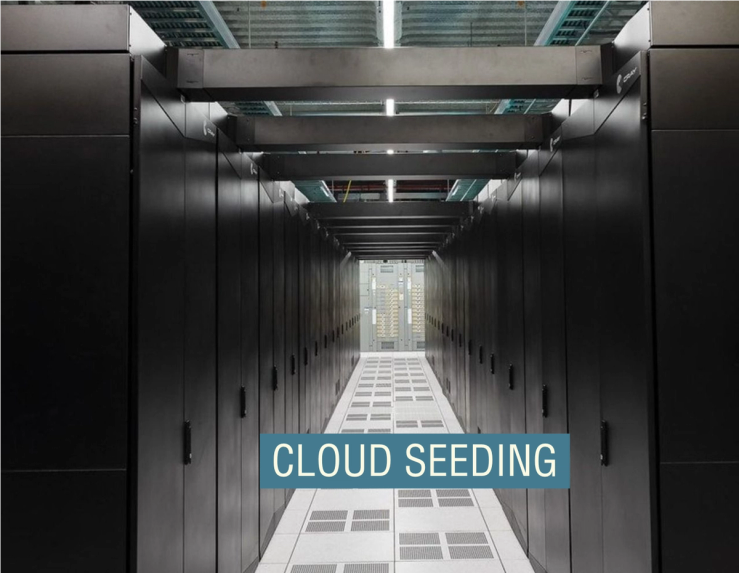The Scoop
Abu Dhabi artificial intelligence firm G42 has built up four times the computing capacity in the US compared to the UAE, forged out of its relationship to California chipmaker Cerebras Systems as an investor and top customer.
Across data centers in California, Texas, and Minnesota, G42 has 21 exaflops of processing power, Talal Al Kaissi, the acting group chief global affairs officer at G42, told Semafor. This computing capacity is largely housed on a supercomputer network called Condor Galaxy, which is still being built in partnership with Cerebras, expected to reach 36 exaflops by the end of the year, Al Kaissi said.
By comparison, G42 has five exaflops of processing power in the UAE. Partly as a result, G42 has trained its Arabic large language model, Jais, in the US.
One exaflop is a measure of a computer’s power, and equals the ability to calculate at least one quintillion (or a billion billion) floating point operations (or “flops”) in a second.
The specific scale of G42’s activity in the US compared to the UAE has not previously been reported.
Meanwhile, G42 is only just beginning to deploy Nvidia’s cutting-edge H100 chips in data centers in the UAE. Its parallel efforts in the world’s largest nation for data center capacity underscores the seriousness of the UAE’s ambitions in AI, which has faced hurdles from the Biden administration over concerns about ties to China and US export curbs of chips to the Gulf.
Al Kaissi, who spent nine years in Washington in the trade and commercial office of the UAE embassy during the Obama and Trump administrations, said he does not think a change of leadership in January will have an impact on the UAE’s AI business in the US.
“We have to work closely with the US on advanced technologies,” he said. “For us, it shouldn’t really matter who’s there. We need to just keep doing what we’re doing… [we’ll] keep supporting the industry more broadly and being a responsible custodian of this infrastructure.”
In this article:
Know More
In November 2021 — a year before OpenAI’s ChatGPT took the world by storm — G42, through an affiliate, acquired a 1% stake in Cerebras for $40 million, valuing the company at $4 billion, according to a recent filing to the SEC by Cerebras as the chipmaker prepares for an IPO.
Those plans to go public are now on hold as Cerebras faces delays with a US national security review of G42’s minority investment, Reuters reported.
Two years after G42 purchased a stake, it also became a significant customer: The Emirati firm accounted for 83% and 87%, respectively, of Cerebras’ total revenue for 2023 and the first six months of this year, according to the S-1 filing.
In addition to increasing spending as a customer, G42 — which counts Abu Dhabi sovereign wealth fund Mubadala, Sheikh Tahnoon bin Zayed’s Royal Group, American private equity firm SilverLake, and hedge funder Ray Dalio’s family office as investors — it also plans to up its stake in Cerebras, agreeing in May to purchase a further $335 million worth of preferred shares by April 15 of next year, according to the filing.
Cerebras, which competes with industry leader Nvidia, provides a large part of G42’s infrastructure. But deals struck this year by G42 with other American firms like Qualcomm and AMD show that the AI firm is thinking seriously about diversifying its supplier mix. “We have the ability to be agnostic” about the chips we buy, Al Kaissi said, adding that drawing from different platforms allows the firm to be more cost competitive.
Cerebras acknowledged its “dependence on our relationship with G42″ as its top risk in its S-1 filing: “Any negative changes in the demand from G42, in G42’s ability or willingness to perform under its contracts with us, in laws or regulations applicable to G42 or the regions in which it operates, or in our broader strategic relationship with G42 would harm our business.”
A Cerebras spokesperson, citing a pre-IPO quiet period, declined to comment.
Kelsey’s view
Relationships between Abu Dhabi and US companies like Nvidia, Microsoft, and OpenAI have gotten all the buzz. But G42’s investment in Cerebras in 2021 and the productive relationship that has followed is akin to the favored Emirati pastime of backing the right racehorse.
The two companies are now breaking away in tandem — if US regulators will let them.
G42’s growing computing capacity on US soil is bolstering one of the most promising American entrants in the AI race as it makes its way to the public markets. The IPO’s delay is yet another test of how much Gulf influence will be tolerated when it comes to Western tech.
Room for Disagreement
While Cerebras has acknowledged its dependence on G42, the dependence cuts both ways as the debate over shipping chips to the Gulf is still ongoing: The Biden administration said last week they are considering capping chip export licenses to foreign countries including the UAE and Saudi Arabia, meaning G42’s significant computing footprint in the US remains a strategic imperative.
Notable
- AI data centers responsible for products like ChatGPT will soon reach size limits on the aging American energy grid, Microsoft Azure Chief Technology Officer Mark Russinovich told Semafor.
- Google is addressing the energy issue with plans to power its AI data centers using small nuclear reactors.


